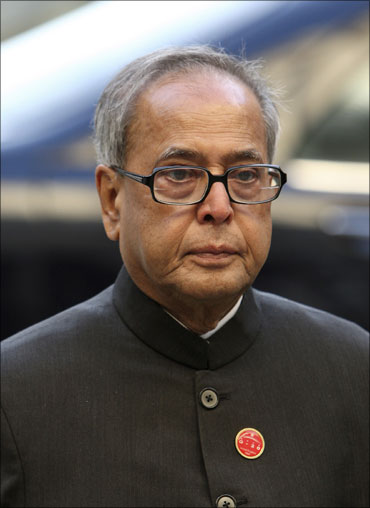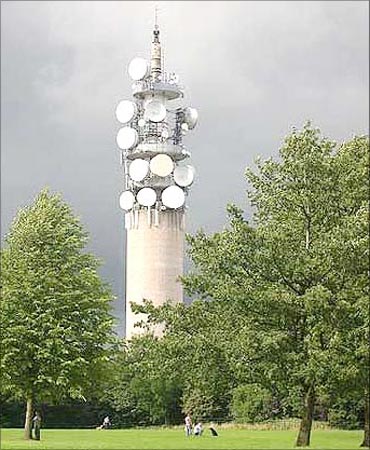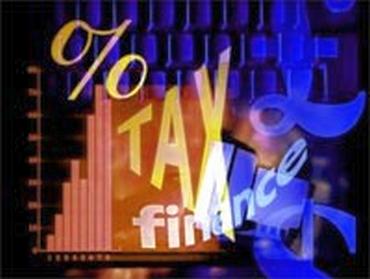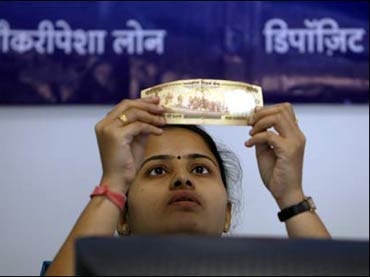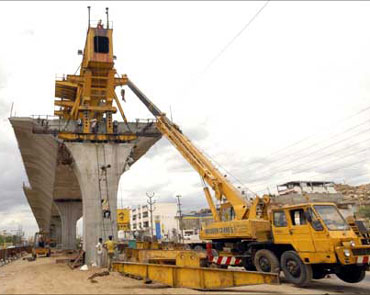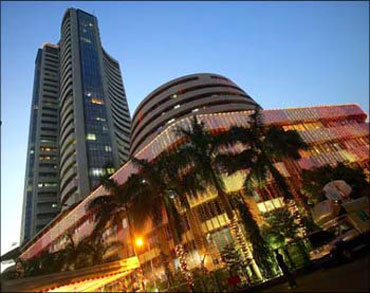 | « Back to article | Print this article |
Budget: What to expect, what not to expect
Amid speculation that duties might be raised as Finance Minister Pranab Mukherjee rolls back the economic stimulus, the Budget for 2011-12 will be presented on February 28.
But Mukherjee's job is not an enviable one this time: he has his hands full. He faces a tough challenge as he has to try and present a balanced Budget; one that will appease the aam aadmi and also not hamper growth.
So what is it that you can expect from the Budget? And what should you not expect?
Budget 2011-12 will provide the right opportunity to the government to allay the anxiety of one and all given the spate of negative news the country is dealing with at this point in time, says an ICICI Direct pre-Budget review.
ICICI expects the Budget to be a populist one mainly for the aam aadmi (relaxation in tax slabs and high social spending) given the rising prices of essential commodities.
The Budget should also seriously focus on attracting fresh investments and focus on providing a better environment for speedy execution of the same so as to contain the secular consumption growth.
Also, this Budget will mark the end of the fiscal stimulus that it had provided in 2008-09.
Click NEXT to read on . . .
Budget: What to expect, what not to expect
Key points to watch out for
Budget 2011-12 will see the full exit from the fiscal stimulus. It is expected that there will be a 2 per cent rollback in excise duty and services tax, which will strengthen the indirect tax revenue for the Centre in 2011-12.
There may be a new set of services that will be bought under the services tax net (like CA audit, services related to corporate finance and accounts, hospitals, OPD services, etc.)
Buoyancy in the corporate sector and rising income levels of individuals will allow the government to budget in higher direct tax revenues. It is expected that direct tax revenues to grow at 14.3% and 16.7% for FY11E and FY12E, respectively
It is expected that divestment to happen in FY12 to the tune of Rs 35,000 crore. Though the one-off in the form of 3G auctions will be missing, a surprise in the form of amnesty scheme can propel the government kitty.
Click NEXT to read on . . .
Budget: What to expect, what not to expect
Tax exemption for investing in infra bonds may go up
On the spending side, though there may not be enough for the government to do, social sector spending and infrastructure spending will continue to get higher allocation.
Special focus may be put on creating vehicles and systems for long-term funding required for developing Infrastructure.
Limit for tax exemption for investing in infrastructure bonds may be increased from the current limit of Rs 20,000 per annum
The government may budget in higher subsidies on account of food subsidy (high food inflation) and petroleum subsidy (higher oil prices).
For FY11E, It is expected that the revised bill for subsidies at Rs 1.65 trillion vs. Rs 1.16 trillion as per budget estimates.
On the borrowing front, It is expected that the government to budget in a gross market borrowing of Rs 4.8 trillion for FY12E vs. Rs 4.57 trillion borrowed in FY11E.
Click NEXT to read on . . .
Budget: What to expect, what not to expect
Some relief on individual tax slabs likely
Also, there may be some announcements related to the roadmap of certain key reforms like enactment and setting a definite implementation timeline for GST and DTC.
Apart from these, we may see some relief on individual tax slabs (populist move on the other hand as it will put money in the hands of the common man to combat inflation). This will be a natural move to align with provisions of DTC.
It is expected that the government to budget a gross fiscal deficit of 4.8% for 2010-11RE and put a target of 5.1% deficit for 2011-12BE.
All in all, ICICI believes that Budget 2011-12 will definitely focus on fiscal consolidation. However, it will also manage to anchor in long-term growth expectations.
Click NEXT to read on . . .
Budget: What to expect, what not to expect
ICICI Direct believes that high inflation and subsequent monetary action will have its impact on GDP growth in H1FY12.
However, monetary action alone cannot solve the problem of inflation.
Policy directives should be more investment conducive to remove infrastructure bottlenecks so as to mitigate demand supply shocks in the system.
Tight liquidity, high government borrowing programme and rising commodity prices will pose significant headwinds for GDP expansion.
Click NEXT to read on . . .
Budget: What to expect, what not to expect
What will the Budget focus on?
Fiscal stimulus in the form of various tax cuts, increase in Sixth Pay Commission, farm loan waiver and high emphasis on social spending has had a more than required impact on intensifying the consumption cycle in the economy over the last couple of years.
However, at the same time, the focus on creating infrastructure to support the secular trend in consumption is lagging behind by a wide margin.
Given the domestic backdrop at this point in time It is expected that the Budget to be a populist one so that the government can put more money in the hands of the common man to combat the inflationary environment.
ICICI Direct believes that the government should rather focus on supply side issues the economy is facing and try to reduce the velocity of the consumption cycle so that it enables the system to tackle the problems of high inflation, high input prices and high interest rates without hurting GDP growth rates much.
Click NEXT to read on . . .
Budget: What to expect, what not to expect
On the supply side, it is expected that the government to focus more on:
Food security (focus on food security via creation of warehousing & distribution infrastructure so that demand-supply shocks can be effectively managed).
Infrastructure development and execution of the same with less regulatory hurdles possible (issues relating to land acquisition and other clearances in sectors such as roads, power and mining).
Giving more impetus to private sector participation so that execution becomes more effective and the government, on the other hand, can focus on the implementation part.
Policy reforms in the oil & gas sector: For instance, effective solution to the deadlock over the Cairn Energy and Vedanta deal can have a positive bearing on the forthcoming NELP IX auctions. This will be encouraging for attracting fresh investments in the energy sector.
This will add to the energy security of the country.
Focusing on creating a vibrant corporate debt market and financial instruments so as to provide necessary funding for infrastructure development at a reasonable cost of borrowing.
Click NEXT to read on . . .
Budget: What to expect, what not to expect
Subsidy expenses to overshoot target
In the indirect tax revenue segment, customs duty and excise duty have registered healthy growth of 66% and 37% YoY in 9MFY11.
Growth in indirect tax revenue was far better than the direct tax revenue segment. Even after the modifications in individual income tax slabs last year overall direct tax revenues rose 18.1% YoY (9MFY10) due to robust performance on the corporate tax revenue front (up 20.4% YoY for 9MFY11).
On the other hand, robust consumption growth in the economy can lead to 40% YoY growth in indirect tax revenues in 9MFY11.
Overall collections from 3G and BWA auctions stood at a record Rs 1.06 trillion leading to a whopping jump in non-tax revenues by 136% for 9MFY11. This will provide enough leeway for the government to manage its fiscal position in FY11 despite high inflation and high commodity prices.
Capital receipts have grown by 278% YoY mainly due to higher receipts from divestments. Till now the government has raised over Rs 22,760 crore from the stake sale of PSU companies in 9MFY11.
The expenditure, both plan and non plan, has risen 11.2% YoY in 9MFY11.
It is expected that subsidy expenses to overshoot the budgetary targets owing to high crude prices and high food prices.
It is expected that the total subsidy bill in FY to balloon to Rs 1.65 trillion from the budgeted figure of Rs 1.16 trillion.
Click NEXT to read on . . .
Budget: What to expect, what not to expect
Moderate rise in allocation to flagship plans
Gross fiscal deficit for 9MFY11 stood at Rs 1,71,249 crore.
The tax to GDP ratio is expected to rise to 11.3% in FY11E and 11.7% in FY12E.
The budgeted tax revenue growth has been built at 22% in FY11 IE and 14% for FY12 IE. Similarly, growth in non-tax revenues will be 99% for FY11 IE due to the robust collection made by the government for 3G and BWA auctions.
The gross fiscal deficit for FY11BE was pegged at 5.5%. It is expected that this to be at 4.8% for FY11E and 5.1% for FY12E.
It is expected that non-plan expenditure to rise by 13% driven by a rise in interest payment and defence allocation.
Growth in total expenditure for FY11BE was at 8.5%. It is expected that Budget 2011-12 to account for 12.5% YoY growth.
Flagship programmes have witnessed muted allocation in FY11BE.
Going ahead, ICICI Direct believes that that in FY12E there will be a moderate rise in allocation towards various social flagship programmes due to fiscal constraints of the government.
Click NEXT to read on . . .
Budget: What to expect, what not to expect
Amnesty Scheme: Can it be a trump card?
The 3G and BWA auctions were the trump cards for the government in the last budget. So what can change things this time around for the government in wake of scams, corruptions and reforms failure?
ICICI Direct believes that by implementing an Amnesty Scheme (the way the United Front government did it in 1997-98), the allegations against it will turn into a saviour for the government, on the one hand, and help manage the fiscal balance, on the other.
Though one cannot quantify the modalities of the scheme, if implemented, for sure it will provide enough headroom for the government to combat inflationary pressures and rising commodity prices via this unknown swan.
Click NEXT to read on . . .
Budget: What to expect, what not to expect
Borrowings to stay high
Budget 2010-11 has accounted for Rs 457,000 crore of gross market borrowings and Rs 345,000 crore of net market borrowings. The same has been completed in February 2011.
However, one has to keep in mind the fact that it will be a tough task for the government going into FY12 as ICICI expects the borrowing to be higher vis-a-vis the borrowings in FY11.
It will be a tight rope for the government to walk upon as the absence of windfall from the 3G Auction will be a missing variable for the government.
Also, there is an upside risk to the subsidy bill in the wake of higher crude prices. On the other hand, any extra populist measure from the government (high spending on social schemes) will only add to its borrowing kitty.
Apart from these, high borrowings will really lead to crowding out of the private sector in FY12E vis-a-vis FY11E as corporates thrive on buoyant equity market conditions to meet their funding requirement. This may not be the case in FY12E (capex and working capital loans will become costly and hard to find by for medium and small enterprises).
Click NEXT to read on . . .
Budget: What to expect, what not to expect
Divestment
Divestments, on the other hand, have been budgeted at Rs 40,000 crore by FY11BE. Till now, the government has raised Rs 22760 crore from the divestment process in 9MFY11.
It is expected that the ONGC FPO to hit the markets by March 2011. This will add another Rs 12,000 crore. This will take the total tally to Rs 34,760 crore of divestment proceeds in FY11E.
For FY12E, ICICI Direct has built in divestment proceeds of Rs 35,000 crore. However, this estimate carries a caveat that equity markets should be receptive to primary papers.
